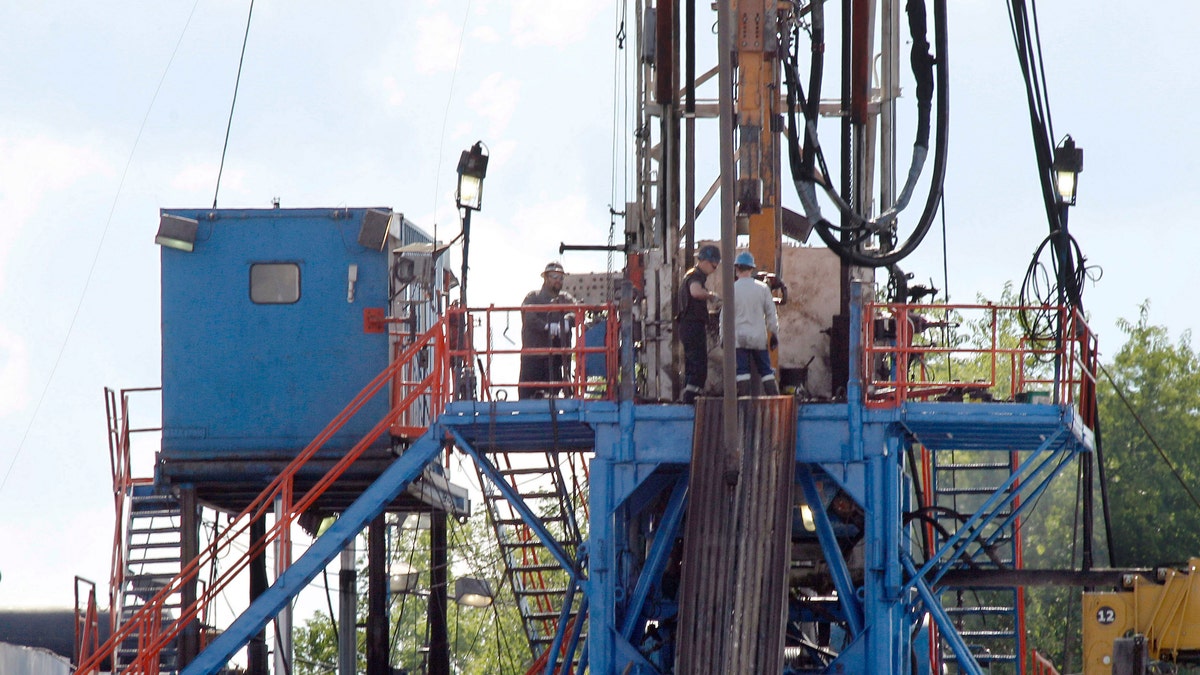
FILE - In this June 25, 2012 file photo, a crew works on a gas drilling rig at a well site for shale based natural gas in Zelienople, Pa. The National Park Service says it is withdrawing "inappropriate" comments about a proposed rule regulating hydraulic fracturing operations on public lands. (AP Photo/Keith Srakocic, File)
WASHINGTON – The National Park Service has withdrawn "inappropriate" comments about a proposed rule regulating hydraulic fracturing operations on public lands.
Park Service Director Jonathan Jarvis says no one in management reviewed the staff comments, which he said were submitted erroneously to the federal Bureau of Land Management. Both agencies are part of the Interior Department.
In a letter to Rep. Rob Bishop, R-Utah, Jarvis said the park service erred when it submitted the unsigned comments, which quoted a New York Times opinion column written by Cornell University Professor Anthony Ingraffea, a well-known critic of hydraulic fracturing, or fracking.
Ingraffea has argued that shale gas produced by fracking poses a greater global warming risk than coal, primarily because of methane leaks during production.
Methane is far more potent at trapping heat than carbon dioxide, the most abundant global warming gas, although it doesn't stay in the air as long.
In a Nov. 13 letter, Jarvis said the park service was not relying on the July 29 column, "or any other opinion column as a basis in decision-making."
Ingraffea's column, which criticized the notion of shale gas as a "bridge" fuel to a lower carbon future, was "cited for illustrative purposes" and was not the technical basis for the agency's comments, Jarvis said. Still, he called the agency's actions inappropriate and said he was withdrawing the entire seven-page comment from the public record.
Bishop said he was pleased at Jarvis's action, but he accused the park service of trying to "pass off unsubstantiated information as `science' `' in what he called a "thinly veiled attempt to vilify energy production and hydraulic fracturing on our public lands."
The agency's action "illustrates a shared agenda" between the Obama administration and "anti-energy" special interest groups, Bishop said. Ingraffea is president of Physicians, Scientists and Engineers for Healthy Energy, a nonprofit group, and has appeared with the "Artists Against Fracking Coalition," an activist group that includes Yoko Ono and other celebrities
Hydraulic fracturing involves pumping huge volumes of water, sand and chemicals underground to split open rocks to allow oil and gas to flow. Improved technology has allowed energy companies to gain access to huge stores of natural gas underneath states from Wyoming to New York but has raised widespread concerns that it might lead to groundwater contamination and even earthquakes.
A draft rule issued this spring would require companies that drill for oil and natural gas on federal lands to publicly disclose the chemicals used in fracking operations. A final rule is expected next year.












































